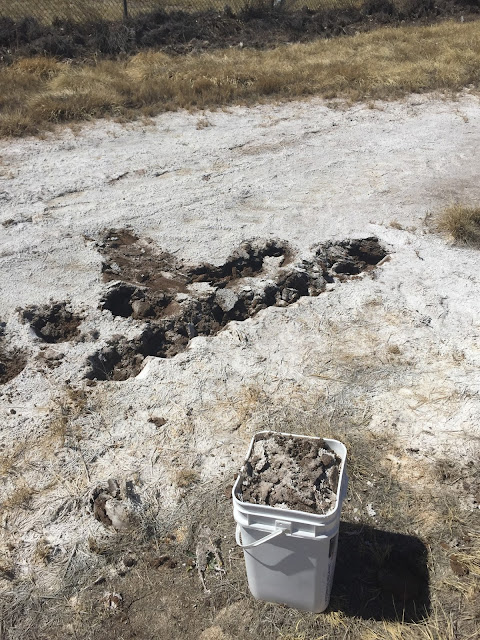Last summer we did some Proof of Concept testing at the New Mexico Consortium labs, determining if the Supramolecular Aromatic Chemistry coming from the Humic molecules in TerraPro provided a Mechanism of Action in fixing or controlling sodic saline conditions. The tests went well and with positive results, however there were a few steps that got missed or left out that I'd like to get some measurements on, so Anna and I will do a repeat of a similar tests using our new lab in Los Lunas. I'm hoping that Kevin Devine and Stephen Gomez, both highly qualified professional chemists can help me do some test and measurements once the grow out phase is completed. I collected 20 gallons of soil from this spot near Socorro New Mexico where even the native salt grass was beyond its tolerance and could not grow. You can see the salt grass growing close to the collection site but not on it. I've taken the soil back to the lab, will send samples off to a lab for a pre-test analysis, and follow that up with a post test analysis. In the meantime we shall see what increment of TerraPro gives us the best performance germinating some stuff. When we did this last summer with Los Alamos National Labs, the post soil analysis phase was skipped because the soil was thrown away after the roots of the plants were extracted and measured for microbial characteristics. I asked that the soil be returned to me, but that didn't happen.
The Labile Carbon is also known as the 'Rapid Cycling Carbon' and its composed of all the Soil Organic Matter that is dead and actively decomposing. It's benefit to the soil is that it provides a source for minerals that are being recycled as potential plant nutrients, so in a sense it's Nature's fertilizer. Active Carbon also known as Reactive Carbon is more complex than the Labile Carbon in that its composed of all the dead and actively decomposing organic matter plus all the living soil microbial community that will eventually die and begin decomposing. For example, the hyphae of mycorrhizae only live about 5 to 7 days before they die and start to decompose, while the fungus organism itself may live far longer. Recalcitrant Carbons are the Humic substances made up of complex organic chemistry, some of which is inert and some of which is very reactive and are powerful biologics, such as the Humic Acids. Recalcitran...



